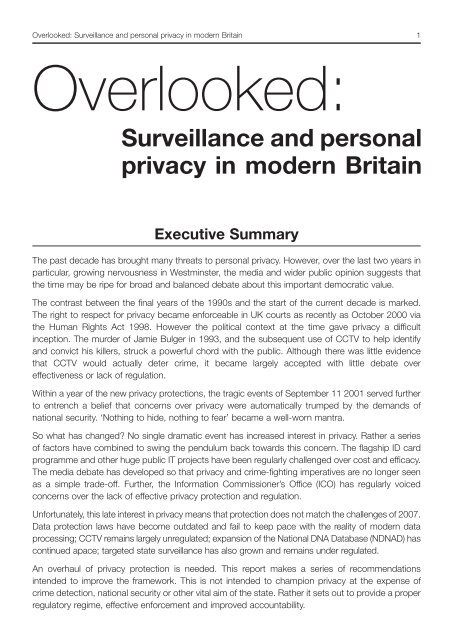Overlooked - Liberty
Overlooked - Liberty
Overlooked - Liberty
You also want an ePaper? Increase the reach of your titles
YUMPU automatically turns print PDFs into web optimized ePapers that Google loves.
<strong>Overlooked</strong>: Surveillance and personal privacy in modern Britain 1<br />
<strong>Overlooked</strong>:<br />
Surveillance and personal<br />
privacy in modern Britain<br />
Executive Summary<br />
The past decade has brought many threats to personal privacy. However, over the last two years in<br />
particular, growing nervousness in Westminster, the media and wider public opinion suggests that<br />
the time may be ripe for broad and balanced debate about this important democratic value.<br />
The contrast between the final years of the 1990s and the start of the current decade is marked.<br />
The right to respect for privacy became enforceable in UK courts as recently as October 2000 via<br />
the Human Rights Act 1998. However the political context at the time gave privacy a difficult<br />
inception. The murder of Jamie Bulger in 1993, and the subsequent use of CCTV to help identify<br />
and convict his killers, struck a powerful chord with the public. Although there was little evidence<br />
that CCTV would actually deter crime, it became largely accepted with little debate over<br />
effectiveness or lack of regulation.<br />
Within a year of the new privacy protections, the tragic events of September 11 2001 served further<br />
to entrench a belief that concerns over privacy were automatically trumped by the demands of<br />
national security. ‘Nothing to hide, nothing to fear’ became a well-worn mantra.<br />
So what has changed No single dramatic event has increased interest in privacy. Rather a series<br />
of factors have combined to swing the pendulum back towards this concern. The flagship ID card<br />
programme and other huge public IT projects have been regularly challenged over cost and efficacy.<br />
The media debate has developed so that privacy and crime-fighting imperatives are no longer seen<br />
as a simple trade-off. Further, the Information Commissioner’s Office (ICO) has regularly voiced<br />
concerns over the lack of effective privacy protection and regulation.<br />
Unfortunately, this late interest in privacy means that protection does not match the challenges of 2007.<br />
Data protection laws have become outdated and fail to keep pace with the reality of modern data<br />
processing; CCTV remains largely unregulated; expansion of the National DNA Database (NDNAD) has<br />
continued apace; targeted state surveillance has also grown and remains under regulated.<br />
An overhaul of privacy protection is needed. This report makes a series of recommendations<br />
intended to improve the framework. This is not intended to champion privacy at the expense of<br />
crime detection, national security or other vital aim of the state. Rather it sets out to provide a proper<br />
regulatory regime, effective enforcement and improved accountability.















